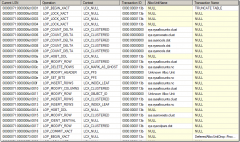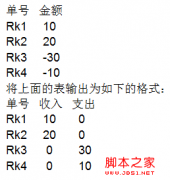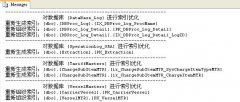freetds简介、安装、配置及使用介绍(2)
功 能:得到sql语句的执行结果。返回值如果为NO_MORE_RESULTS=0,表明sql查询为空值(就是没有一条满足条件的结果),如果为(FAIL)=-1,表明查询出错,如果为(SUCCESS)=1,表明有结果且不为空。
4. DBROWS(全大写)
函数原形:DBROWS(DBPROCESS *proc);
功 能:取出一行记录的信息。
5. Dbbind
函数原形:Dbbind(DBPROCESS *proc,int colmn,
功 能:将sql查询出来的结果绑定到一个变量。第一个参数为从数据库那里拿的句柄,第二个参数是对应你的select语句中查询需要的字段(注:必须是按照select顺序绑定的,例如select user,password from hist1 ,如果值为1,就是绑定的user),第三个参数是绑定字段的类型,最后一个参数是绑定的变量。
6. Dbnextrow
函数原形:Dbnextrow(DBPROCESS *proc);
功 能:该函数将取出满足sql语句的每一行,返回值为0,代表处理结束,返回值为-1出错。
7. Dbcancel
函数原形:Dbcancel(DBPROCESS *proc);
功 能:清空上次查询得到的数据集,如果是一个句柄的话,每次重新执行select语句之前都要调用它清空结果,不然数据库会报错的。
8. Dbclose
函数原形:Dbclose(DBPROCESS *proc);
功 能:关闭句柄。当不再使用时必须关闭句柄。
9. Dbinit
函数原形:Dbinit()
功 能:初识化数据库连接。返回值为-1出错。
10. Dblogin
函数原形:LOGINREC *Dblogin();
DBSETLUSER(login,SOFT); //set the database user
DBSETLPWD(login,SOFTPASS);//set password
功 能:根据用户名和密码连接数据库。
11.Dbcount
函数原形:Dbcount(DBPROCESS *proc);
功 能:该函数将得到sql结果集被处理的行数,可以用它来判断你的select语句是否得到正确的处理。
12.Dbopen
函数原形:DBPROCESS * Dbopen(LOGINREC *login,NULL);
功 能:返回一个操作数据库的句柄。
另外再介绍两个关于数据库的出错信息的函数:
dberrhandle(int *err);
dbmsghandle(int* err);
实例代码
#include <stdio.h>
#include <stdlib.h>
#include <string.h>
#include <unistd.h>
#include <sqlfront.h> /* sqlfront.h always comes first */
#include <sybdb.h> /* sybdb.h is the only other file you need */
#define SQLDBIP " " //SQL数据库服务器IP
#define SQLDBPORT " " //SQL数据库服务器端口
#define SQLDBNAME " " //SQL数据库服务器数据库名
#define SQLDBUSER " " //SQL数据库服务器数据库用户名
#define SQLDBPASSWD " " //SQL数据库服务器用户密码
#define SQLDBSERVER SQLDBIP":"SQLDBPORT
#define DBSQLCMD "select * from yancao"
int main(int argc, char *argv[])
{
int i, ch;
LOGINREC *login; //描述客户端的结构体,在连接时被传递到服务器.
DBPROCESS *dbproc; //描述连接的结构体,被dbopen()函数返回
RETCODE erc; //库函数中最普遍的返回类型.
/*************************************************************/
//在开始调用本库函数前常常要先调用dbinit()函数
if (dbinit() == FAIL) {
fprintf(stderr, "%s:%d: dbinit() failed\n",argv[0], __LINE__);
exit(1);
}
//dblogin()函数申请 LOGINREC 结构体,此结构体被传递给dbopen()函数,用来创建一个连接。
//虽然基本上不会调用失败,但是检查它!.
if ((login = dblogin()) == NULL) {
fprintf(stderr, "%s:%d: unable to allocate login structure\n",argv[0],__LINE__);
exit(1);
}
//LOGINREC结构体不能被直接访问,要通过以下宏设置,下面设置两个必不可少的域
DBSETLUSER(login, SQLDBUSER);
DBSETLPWD(login, SQLDBPASSWD);
/*************************************************************/
//dbopen()与服务器建立一个连接. 传递 LOGINREC 指针和服务器名字
if ((dbproc = dbopen(login, SQLDBSERVER)) == NULL) {
fprintf(stderr, "%s:%d: unable to connect to %s as %s\n",
argv[0], __LINE__,
SQLDBSERVER, SQLDBUSER);
exit(1);
}
// 可以调用dbuser()函数选择我们使用的数据库名,可以省略,省略后使用用户默认数据库.
if (SQLDBNAME && (erc = dbuse(dbproc, SQLDBNAME)) == FAIL) {
fprintf(stderr, "%s:%d: unable to use to database %s\n",
argv[0], __LINE__, SQLDBNAME);
exit(1);
}
/*************************************************************/
dbcmd(dbproc, DBSQLCMD);//将SQL语句填充到命令缓冲区
printf("\n");
if ((erc = dbsqlexec(dbproc)) == FAIL) {
fprintf(stderr, "%s:%d: dbsqlexec() failed\n", argv[0], __LINE__);
exit(1); //等待服务器执行SQL语句,等待时间取决于查询的复杂度。
}
/*************************************************************/
//在调用dbsqlexec()、dbsqlok()、dbrpcsend()返回成功之后调用dbresults()函数
printf("then fetch results:\n");
int count = 0;
while ((erc = dbresults(dbproc)) != NO_MORE_RESULTS) {
struct col { //保存列的所有信息
char *name; //列名字
char *buffer; //存放列数据指针
int type, size, status;
} *columns, *pcol;
int ncols;
int row_code;
if (erc == FAIL) {
fprintf(stderr, "%s:%d: dbresults failed\n",
argv[0], __LINE__);
exit(1);
}
ncols = dbnumcols(dbproc);//返回执行结果的列数目
if ((columns = calloc(ncols, sizeof(struct col))) == NULL) {
perror(NULL);
exit(1);
}
/* read metadata and bind. */
for (pcol = columns; pcol - columns < ncols; pcol++) {
int c = pcol - columns + 1;
pcol->name = dbcolname(dbproc, c); //返回指定列的列名
pcol->type = dbcoltype(dbproc, c);
pcol->size = dbcollen(dbproc, c);
printf("%*s(%d)", 20, pcol->name, pcol->size);
if ((pcol->buffer = calloc(1, 20)) == NULL) {
perror(NULL);
exit(1);
}
erc = dbbind(dbproc, c, NTBSTRINGBIND, 20, (BYTE*)pcol->buffer);
if (erc == FAIL) {
fprintf(stderr, "%s:%d: dbbind(%d) failed\n",
argv[0], __LINE__, c);
exit(1);
}
erc = dbnullbind(dbproc, c, &pcol->status); //(5)
if (erc == FAIL) {
fprintf(stderr, "%s:%d: dbnullbind(%d) failed\n",
argv[0], __LINE__, c);
exit(1);
}
}
printf("\n");
/* 打印数据 */
while ((row_code = dbnextrow(dbproc)) != NO_MORE_ROWS) {//读取行数据
switch (row_code) {
case REG_ROW:
for (pcol=columns; pcol - columns < ncols; pcol++) {
char *buffer = pcol->status == -1?
"null" : pcol->buffer;
printf("%*s ", 20, buffer);
}
printf("\n"); break;
case BUF_FULL: break;
case FAIL:
fprintf(stderr, "%s:%d: dbresults failed\n",
argv[0], __LINE__);
exit(1); break;
default: // (7)
printf("data for computeid %d ignored\n", row_code);
}
}
/* free metadata and data buffers */
for (pcol=columns; pcol - columns < ncols; pcol++) {
free(pcol->buffer);
}
free(columns);
if (DBCOUNT(dbproc) > -1) /* 得到SQL语句影响的行数 */
fprintf(stderr, "%d rows affected\n", DBCOUNT(dbproc))
}
dbclose(dbproc);
dbexit();
}





